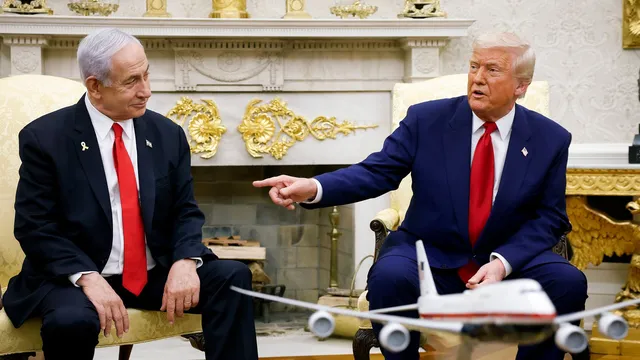
Iranian cleric declares Trump and Netanyahu enemies of God
2025-06-30 16:30- Iran's top cleric issued a religious decree against President Trump and Prime Minister Netanyahu, branding them as warlords.
- The fatwa comes in the wake of Israeli airstrikes on Iranian military facilities and U.S. involvement in the conflict.
- This act has been condemned by some experts as an incitement to terrorism and signals potential global violence in the name of religion.
Express your sentiment!
Insights
In June 2025, significant tensions arose between Iran, the United States, and Israel following a series of military actions. Iranian clerics, led by Grand Ayatollah Naser Makarem Shirazi, issued a fatwa condemning U.S. President Donald Trump and Israeli Prime Minister Benjamin Netanyahu, labeling them as 'enemies of God.' This statement followed the Israeli airstrikes that targeted Iranian nuclear and military facilities on June 13, 2025, during which multiple top Iranian scientists and military leaders were reportedly killed. The strikes were characterized by Israeli officials as necessary actions to prevent Iran from acquiring nuclear weapons. The Iranian response was swift; Iran launched retaliatory ballistic missiles at Israeli cities, escalating the conflict. A few days after the Israeli attacks, U.S. forces also struck three of Iran's nuclear sites, raising the stakes further in this contentious geopolitical climate. Amid these exchanges, Iranian Supreme Leader Ali Khamenei emerged to proclaim victory and threaten additional action against American airbases in the Middle East. This period, referred to as the '12-Day War,' highlighted the precarious relationship and hostilities existing between the nations, resulting in serious debates about international security and religious extremism. Experts warned that the fatwa issued by Makarem could be seen as an incitement to terrorism, with the implications that those identified as mohareb could face severe consequences under Iranian law. Critics, including British-Iranian commentator Niyak Ghorbani, suggested that such declarations from clerics indicate a broader ambition for religiously motivated violence beyond Iran's borders. Historically, fatwas have been leveraged to incite violence within and outside Iran, making this recent declaration a matter of international concern. The fatwa, which identified Trump and Netanyahu as waging war against God, not only signals internal Iranian law enforcement guiding radical actions but also poses serious implications for international relations. As this situation continues to develop, the interplay of religion and politics in this context remains a focal point of global discourse.
Contexts
The impact of fatwas on international relations has gained increasing attention in recent years, particularly as global interconnectivity continues to rise. A fatwa, an Islamic legal opinion or decree, can influence the actions and attitudes of Muslims around the world, extending its reach beyond local jurisdictions and into the realm of international affairs. The issuance of fatwas can play a vital role in shaping public opinion, national policies, and diplomatic relationships, thereby contributing to the dynamics of international relations. As countries navigate the complexities of the global political landscape, the weight of fatwas can vary significantly based on the authority of the issuing scholar or institution, the context of the decree, and the reception by the broader Muslim community. One of the key areas where fatwas influence international relations is in the realm of conflict resolution and peacebuilding. Religious leaders occasionally issue fatwas advocating for peace or condemning violence, prompting their followers to reconsider involvement in conflicts. For instance, during times of geopolitical tensions, influential scholars can call for unity among Muslims or issue decrees targeting specific actions that may be seen as contrary to Islamic teachings. Such fatwas can either promote dialogue and peace or exacerbate conflicts depending on the perspectives they endorse. The varying interpretations of Islamic law and the potential for politicization of fatwas complicate this interaction further, as some fatwas may serve to justify militant actions or terrorist acts in the eyes of their proponents. Moreover, fatwas can significantly impact diplomatic relations between Muslim-majority countries and other nations. Governments may react to publicly issued fatwas affecting their political interests or relations with Muslim communities, prompting them to either engage with religious leaders or counteract the potential influence of fatwas. Countries may find themselves aligned with or opposed to specific fatwas, leading to shifts in alliances, supporting humanitarian efforts in conflict zones, or managing refugee crises. The interplay between religious authority and state interests often leads to complex negotiations and can sometimes reflect broader international ideologies, such as secularism versus religious governance. The role of technology and social media cannot be overlooked in examining the impact of fatwas on international relations. In the digital age, fatwas can be disseminated rapidly and widely, reaching audiences far beyond traditional congregations. The immediate sharing of religious opinions can lead to swift public reactions and influence global discourse, as well as local sentiments. As various actors leverage social media platforms to amplify their messages and shape narratives, the implications of fatwas in this context are profound, creating potential for both heightened incitement and constructive dialogue. In conclusion, the interaction between fatwas and international relations underscores the essential role of religious guidance in secular political contexts, necessitating a nuanced understanding of how these decrees can shape geopolitical landscapes.